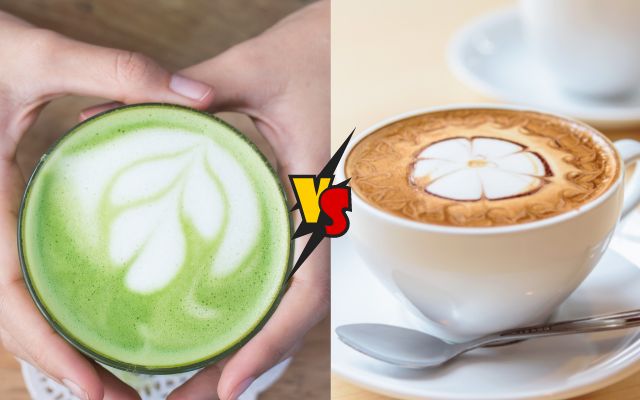Matcha Caffeine Vs Coffee Caffeine: Which Is Healthier?
Matcha is a Japanese green tea powder that is gaining popularity internationally, but coffee is already one of the most often consumed beverages worldwide. You may be interested about how the health advantages of matcha stack up against those of coffee.

Nutrition Matcha vs Coffee
When served without additional components such as milk, sugar, cream, or flavored syrups, both coffee and matcha have a low calorie count in comparison to other beverages.
One teaspoon of the powder (about two grams) is combined with two ounces (sixty milliliters) of hot water to make a traditional cup of matcha.Additionally, one cup of coffee containing 8 ounces (240 mL) has around 96 mg of caffeine, but one gram of matcha contains between 19 and 44 mg of caffeine, which amounts to between 38 and 88 mg of caffeine in a serving size of 2 ounces (60 mL) when made using the conventional technique.The table below compares the nutritional value of an 8-ounce (240 mL) cup of brewed coffee to that of a 2-ounce (60 mL) cup of matcha.The overall caffeine concentration of matcha varies on the quantity of matcha powder used, the type of leaves used to form the powder, the freshness of the leaves, the temperature of the water, and the length of time the leaves are steeped.Both of these beverages have a bitter flavor. Matcha is frequently described as having a grassy or earthy flavor, whereas coffee is recognized for its roasted flavor, which is also described as nutty and chocolatey in scent and flavor.
Caffeine Matcha vs coffee.
Coffee contains significantly more caffeine than matcha. A regular eight-ounce cup of coffee has 95 mg of caffeine. This number may likely change depending on the type of coffee you order. For instance, a 12-ounce cup of cold brew coffee may contain between 150 and 240 milligrams of caffeine.Additionally, the flavor of matcha differs from that of coffee. Others prefer the astringent taste of matcha over the bitter taste of coffee.
Benefits.
Coffee and matcha are both well-known for their various health benefits. In actuality, both of these beverages have similar health advantages.
Possible weight loss help
Caffeine, which is included in both matcha and coffee, has been shown to accelerate the formation of brown adipose tissue, also known as brown fat, as well as increase energy expenditure and fat burning rate.Both caffeine and chlorogenic acid, often known as CGA, are present in coffee. Matcha, in contrast, is abundant in epigallocatechin gallate (EGCG). Both CGA and EGCG have been studied for their potential weight loss benefits.Studies on animals reveal that CGA may have an influence on hormones connected with obesity, which may aid in the reduction of body weight, fat accumulation, triglyceride, and cholesterol levels.
Avoid cancer.
Antioxidants are advantageous substances that buffer the harmful effects of oxidative stress in the body, which, if left unchecked, can contribute to the beginning and progression of a variety of illnesses, including cancer. Several foods, including fruits, vegetables, and others, contain antioxidants.
Heart-protective.
Coffee and matcha both contain a variety of chemicals, some of which have been shown to lessen the risk of cardiovascular disease.Initially, the amount of polyphenols they contain may inhibit platelet aggregation. This may keep your arteries from becoming clogged and minimize your chance of suffering a heart attack.
Other benefits that are shared.
Consuming a cup of coffee or matcha may provide extra advantages, such as improved mental state and cognitive function. Caffeine, which is included in both of these beverages, together with the L-theanine and EGCG in matcha, can improve mood, concentration, memory, and response speeds.augmentation of liver health Consumption of green tea and coffee is connected with a decreased risk of fatty liver disease, cirrhosis, and fibrosis of the liver.
Sum Up.
Coffee and matcha have the potential to boost health when drunk in moderation due to the presence of caffeine and antioxidants. This can be attributed to their ability to boost energy and cognitive performance. Matcha is the beverage to consume if you want to receive health benefits while experiencing fewer caffeine-related jitters and less acidity.
